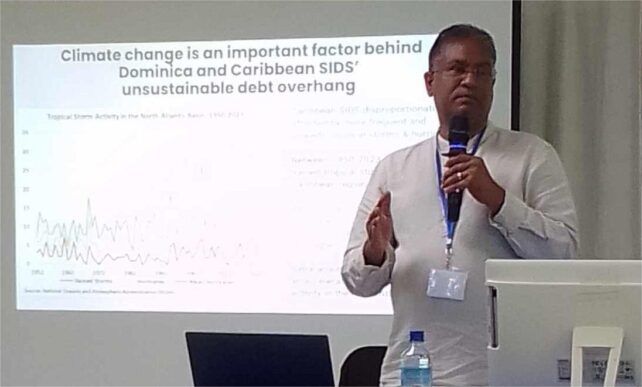
Despite the International Monetary Fund’s (IMF) optimistic Economic Outlook report forecasting a 4.5% growth for Dominica, concerns persist over the nation’s sovereign debt, particularly in light of its climate change objectives.
A National Debt Consultation, hosted by the Caribbean Policy Development Centre (CPDC) at the Prevo Cinemall on May 14th, sparked discussions on mitigating regional sovereign debt and examined Dominica’s debt contribution. The consultation, supported by the Open Society Foundations (OSF) and Climate Emergency Collaboration Group (CEGG), raised questions about the financial feasibility of the ambitions of the Dominica government.
Jwala Rambarran, CPDC’s Senior Economic Policy Advisor, highlighted the substantial costs associated with Dominica’s aim to become the world’s first Climate Resilient country by 2030. He pointed out a financial gap and expressed his intention to find solutions to fund this vision without increasing debt.
Rambarran’s research revealed that $1 billion of the initial $3.5 billion cost to achieve complete climate resilience has been invested since Hurricane Maria. This investment has gone towards rebuilding infrastructure and constructing climate-resilient homes across the island. However, after taking into account the availability of another billion dollars based on budget projections over the next six years to support climate resilience, Rambarran’s estimates indicate a funding gap of $1.5 billion for the next six years. “Imagine you have to fund almost a third of GDP every year; where is this money going to co me from in a country that is heavily indebted?” he asked.
Rambarran also drew attention to the Citizenship By Investment Programme’s Economic Development Finance, which generated about U.S $581 million between 2017 and 2022. He expressed concern over the sustainability of an economy reliant on a single development source and the significant decrease in CBI revenue for the 2022/2023 fiscal year.
“I haven’t gotten the 2023 revenues as yet but the numbers are actually smaller. I’ve confirmed this with a Ministry of Finance official, and with the size of the CBI programme, it is obviously going to get smaller, and it’s also not sustainable to keep relying on one source to fund your development programmes,” the Economic Policy Advisor and former Central Bank Governor stated.
With Public External Debt doubling over two decades from $183 million to $201 million, Rambarran questioned the country’s ability to continue borrowing. He noted that forty percent of External Debt is owed to the International Development Association (IDA).
“You’re heading to almost 100 million dollars owed to IDA, a significant amount for such a small country,” Rambarran noted.
The most recent IMF report advised that despite improvements in Dominica’s Bank’s quality asset, non-performing loans (NPLs) remain high. Dominica ranks as the third most indebted island in the Caribbean and sixth among ten heavily indebted Small Island Development States (SIDS).
The CPDC suggests Sovereign Debt Restructuring, as 94 percent of GDP worth of debt indicates significant “debt distress.” Rambarran warned that the only debt that can potentially be restructured is private debt, which represents only ten percent of debt owed.
“We need money for education, we need money for health, we need money for climate change, but it means that that money is going to be less and less,” he cautioned.
Meanwhile, Geneva Oliverie, Development Specialist of CPDC, informed that her organization is outlining the rise in debts and its effect on the vulnerable in different Caribbean states.
“We came into Dominica on our tour of the Caribbean to really get a sense of how the Dominican people have been affected by issues of debt and climate change and what are some of the remedies that you all see that need to be instituted so that you all can have a better quality of life,” she said.
Olivere concluded that less investment is being made into critical sectors such as education, health, and farming.
The CPDC has hosted consultations in various parts of the Caribbean over the past two years and plans to extend to other regions soon.
The CPDC is non-profit organisation established as a policy unit within the Caribbean Conference of Churches (CCC) whose mandate is to help mitigate debt regionally by way of outlining economic performances of Caribbean countries.

This comes as absolutely no surprise. The supposed growth in the gdp is fuelled by CBI revenues that the people have not benefitted from. The cost of living is rising exponentially compared to the standard of living. Banks have closed, businesses have closed, NEP continues to be a strain on the national treasury, and out population is forever dwindling. On the ground the average Dominican feels and sees it daily. But when you being driven around behind tinted windows daily, jetting all over the world and living in mansions, you may have a different reality (Skerrit and friends).
but personally, i believe it has to get MUCH WORSE before any of this can get any better because our head too hard. We rather sit and watch all other islands do much better, and common sense not telling us to bite the bullet and make the change. If we dont like it we can always change back to what we had or even something else. but no, is that we like. I self stop worry with Dominicans. Fight all you…
ha-ha-haaaaaa! whoyyyyyyyyyy look jox
This doesn’t worry the unseemly “Party fanatic” one bit.
Funding gap eh……..even with de impressive CBI!
Overambitious Skerrit will not achieve that goal
How will that information be reflected in the upcoming budget?
i thought our pm, said we’ve the best economy in the Caribbean, so how is it that gdp is decreasing while we’re the third most indebted island in the Caribbean region. pure mismanagement.
Way Papa mi Daba.
The Economic forum scheduled to take place in Dominica has a very good platform for their discussion and come up with an Economic Strategic Plan.
ALL HEADS MUST ROLL.